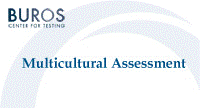Buros-Nebraska Series on Measurement and Testing

Multicultural Assessment in Counseling and Clinical Psychology
Date of this Version
Spring 1996
Document Type
Front/Back Matter
Citation
Published in Multicultural Assessment in Counseling and Clinical Psychology, edited by Gargi Roysircar Sadowsky and James C. Impara (Lincoln, NE: Buros Institute of Mental Measurements, University of Nebraska–Lincoln, 1996).
Abstract
Preface
This work evolved from the 1993 Buros-Nebraska Symposium on Testing and Measurement: Multicultural Assessment, held by the Buros Institute of Mental Measurements, Department of Educational Psychology, at the University of Nebraska-Lincoln. Among the symposium presenters, Stanley Sue, Juris Draguns, Guiseppe Costantino and Thomas Malgady, Janet Helms, Robert Carter, Sandra Choney and John Behrens, Joseph Ponterotto, Gargi Roysircar Sodowsky, and Donald Pope-Davis accepted the Buros Institute's invitation to contribute chapters to an envisioned multicultural assessment volume. The authorssome with the assistance of new collaborators-painstakingly revised their papers. They added measurement and statistical analyses that they have not previously published, advanced the theory-building of their respective topics, and wrote integrative literature reviews, thus providing substantive chapters for this book. With reference to the few multicultural and cross-cultural assessment books, book chapters, and journal reviews that are currently available in professional psychology, this book is an essential complement to them. Its uniqueness is that it responds to the paucity of measurement research in multicultural counseling. This collection might be characterized as recording multicultural assessment's empirical beginnings, a fairly unchartered territory.
Select multicultural instruments that are paper-and-pencil attitude and projective tests, developed recently and cited in refereed journals, are presented. New data are treated to multivariate statistics, exploratory and confirmatory factor analyses, structural equation modeling, cluster analyses, reliability estimation, and norm transformations. Tests are shown to be construct-related to multicultural theories and/ or criterion- related to sociocultural variables. That is, instrument validity is supported through the theoretical groundedness of obtained results, through theory-building based on data interpretation, or through criterion predictions.
Test bias of mainstream instruments are discussed statistically as well as conceptually. Differences in test scores are given an interpretation different from the conclusion that deviant scores indicate deficits. Clinical judgement is shown to be subject to individual bias and to clinicians' immersion in their racial and cultural contexts and their inability to see their imposed bias. Decision trees, guidelines, and assessment reports are provided to illustrate qualitative methods for contextual diagnosis and integrative clinical judgement. Methods to identify social desirability in multicultural self-reports are discussed. Classical measurement theory is argued to overlook the multiplicity of person-environment reactivity that merits investigation in a multicultural society and in a majority-minority sociopolitical system.


Comments
Copyright © 1996 by Buros Institute of Mental Measurements. Digital edition copyright © 2012 Buros Center for Testing.